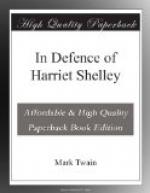I cannot find the “rift”; still it may be there. What the poem seems to say is, that a person would be coldly ungrateful who could consent to count and consider little spots and flaws in such a warm, great, satisfying sun as Harriet is. It is a “little rift which had seemed to be healed, or never to have gaped at all.” That is, “one detects” a little rift which perhaps had never existed. How does one do that? How does one see the invisible? It is the fabulist’s secret; he knows how to detect what does not exist, he knows how to see what is not seeable; it is his gift, and he works it many a time to poor dead Harriet Shelley’s deep damage.
“As yet, however, if there was a speck upon Shelley’s happiness it was no more than a speck”—meaning the one which one detects where “it may never have gaped at all”—“nor had Harriet cause for discontent.”
Shelley’s Latin instructions to his wife had ceased. “From a teacher he had now become a pupil.” Mrs. Boinville and her young married daughter Cornelia were teaching him Italian poetry; a fact which warns one to receive with some caution that other statement that Harriet had no “cause for discontent.”
Shelley had stopped instructing Harriet in Latin, as before mentioned. The biographer thinks that the busy life in London some time back, and the intrusion of the baby, account for this. These were hindrances, but were there no others? He is always overlooking a detail here and there that might be valuable in helping us understand a situation. For instance, when a man has been hard at work at the Italian poets with a pretty woman, hour after hour, and responding like a tremulous instrument to every breath of passion or of sentiment in the meantime, that man is dog-tired when he gets home, and he can’t teach his wife Latin; it would be unreasonable to expect it.
Up to this time we have submitted to having Mrs. Boinville pushed upon us as ostensibly concerned in these Italian lessons, but the biographer drops her now, of his own accord. Cornelia “perhaps” is sole teacher. Hogg says she was a prey to a kind of sweet melancholy, arising from causes purely imaginary; she required consolation, and found it in Petrarch. He also says, “Bysshe entered at once fully into her views and caught the soft infection, breathing the tenderest and sweetest melancholy, as every true poet ought.”
Then the author of the book interlards a most stately and fine compliment to Cornelia, furnished by a man of approved judgment who knew her well “in later years.” It is a very good compliment indeed, and she no doubt deserved it in her “later years,” when she had for generations ceased to be sentimental and lackadaisical, and was no longer engaged in enchanting young husbands and sowing sorrow for young wives. But why is that compliment to that old gentlewoman intruded there? Is it to make the reader believe she was well-chosen and safe society for a young, sentimental husband? The biographer’s device was not well planned. That old person was not present—it was her other self that was there, her young, sentimental, melancholy, warm-blooded self, in those early sweet times before antiquity had cooled her off and mossed her back.




